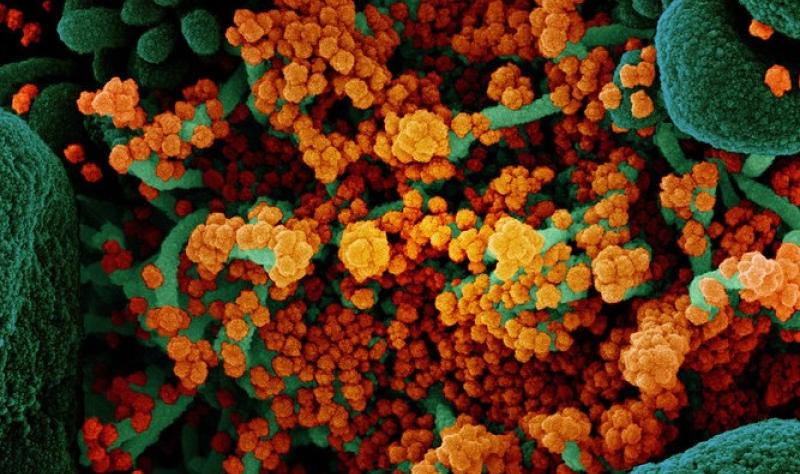News Scan for May 09, 2022


Study: Dogs can sniff out COVID-19 infections with high success rates
In a study published in Open Forum Infectious Diseases, researchers showed canine olfaction—or dog sniffing—was both highly sensitive and specific when it came to identifying patients with COVID-19, even those who were asymptomatic or presymptomatic.
The researchers, based in Hawaii, exposed dogs to sweat samples from 584 participants (ages 6 to 97 years; 24% positive SARS CoV-2 samples and 76% negative SARS CoV-2 samples). Samples were collected from cotton pads runs cross the necks of participants, and the dogs had no prior history of scent training.
During the first part of the study, the testing phase, the dogs detected SARS-CoV-2 from cotton pad samples with a diagnostic sensitivity of 98% and a specificity of 92%.
In the second part of the study, a follow-up screening test in a hospital setting, a single dog screened 153 patients before surgery, and results were compared to polymerase chain reaction (PCR) testing. The dog performed with 96.4% diagnostic sensitivity and 100% specificity.
“The results confirm that canines can be taught to discriminate between sweat samples from SARS-CoV-2-positive and SARS-CoV-2-negative individuals,” the authors concluded. “Sensitivity and specificity were equally high in an implementation phase which took place in a hospital, demonstrating the potential for medical detection dogs to provide screening for COVID-19 in public places such as hospitals, schools, and businesses.”
The authors said dog sniffing could be considered a useful tool for virus detection, especially in places or settings where mass rapid or PCR testing would be improbable.
May 7 Open Forum Infect Dis study
COVID study: Omicron patients shed more live virus than those with Delta
Hospitalized South Korean patients infected with the Omicron SARS-CoV-2 variant shed more live virus 8 days after illness onset than those with the Delta variant, finds a study published today in Open Forum Infectious Diseases.
Led by researchers from Incheon Medical Center, the study involved viral culture of 110 respiratory samples collected daily from 11 patients with mild to moderate COVID-19 within 14 days of symptom onset. The first Omicron case was identified in South Korea on Dec 2, 2021.
Median patient age was 38 years, 5 patients were male, 5 had pneumonia, and 2 had received one dose of COVID-19 vaccine in October 2021. None were immunocompromised, and all had at least one COVID-19 symptom at diagnosis. No patients required supplemental oxygen, the antiviral drug remdesivir, or anti-inflammatory drugs, but 2 received monoclonal antibodies.
Omicron was cultured in 48 of 110 specimens (43.6%) in the first 8 days after illness onset, all from unvaccinated patients. A total of 22% to 100% of unvaccinated patients were positive for Omicron on viral culture. Compared with Delta patients, those with Omicron tested positive for a shorter time (8 vs 10 days, respectively) but had a higher positivity rate (100% vs 74%, respectively). Omicron’s viral load was slightly lower than that of Delta.
The authors said that the study, using culture positivity as a proxy for infectivity, may help explain the recent global Omicron surge. “This study suggests that the Omicron variant may have a shorter infectious stage than the Delta variant,” they wrote. “However, the culture-positive rate of the Omicron variant was higher than that of the Delta variant.”
The researchers added that duration of fever, which many isolation guidelines consider, may not correlate well with the time to positivity on culture. “Improvement of symptoms, including fever, is an important indicator of a decrease in infectivity, but our study results show that the duration of fever might not well correlate with the time to viral culture conversion,” they wrote.
May 9 Open Forum Infect Dis study
Monkeypox case reported in United Kingdom
The UK Health Security Agency (UKHSA) last week reported a confirmed case of monkeypox.
The patient is currently hospitalized, and had a recent history of travel from Nigeria, which is where he is believed to have contracted the infection, UKHSA said in a news release. UKHSA officials are working with the National Health Service (NHS) to contact people who may have been in close contact with the patient, including those on the same flight from Nigeria to the United Kingdom.
Monkeypox is endemic in central and West African countries and is usually a mild, self-limiting illness. The infection can be spread to close contacts, but the risk to the general population is low. The United Kingdom reported three monkeypox cases last summer that involved an index patient who had traveled from Nigeria and two members of the person’s household.
“UKHSA and the NHS have well established and robust infection control procedures for dealing with cases of imported infectious disease and these will be strictly followed,” said UKHSA director of clinical and emerging infections Colin Brown, MBChB.
May 7 UKHSA news release


